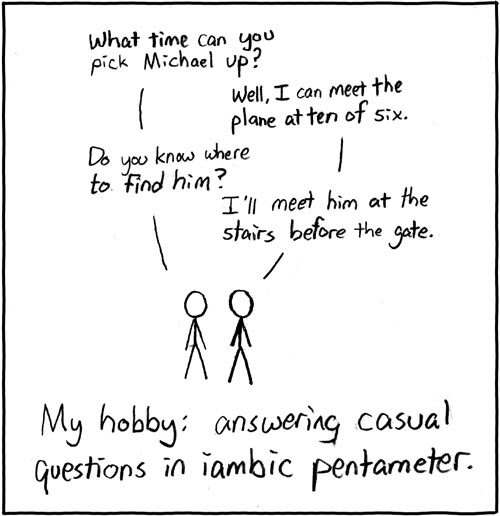A Poster for your Wall
This is for the wall of the room where you do your writing. Here’s the quote:
In words, as fashions, the same rule will hold;
Alike fantastic, if too new, or old:
Be not the first by whom the new are tried,
Nor yet the last to lay the old aside.
—Alexander Pope
- Copy this and paste it into your word processor.
- Set the layout to landscape.
- It’s poetry, so make it left aligned and the first letter of each line capitalized, if it’s not already set this way.
- Select the whole thing and make it as big as you can without messing up the line breaks, and still have a margin of a good inch.
- Change it into an old-fashioned serif font that’s easy to read. (You might need to adjust the size again to keep the line breaks from getting messed up.
- You can make the attribution line right aligned.
- Put a border around it.
Hang it proudly on your wall, and do what it says!
PS: Here’s another one from Mr. Pope that I like:
Vice is a monster of so frightful mien
As to be hated needs but to be seen;
Yet seen too oft, familiar with her face,
We first endure, then pity, then embrace.
Subscribe to this blog's RSS feed
Daylight What Time?
I don’t often do this, but I also don’t often run into something written by a grammar geek, either. So today’s post is pretty much written by somebody else:
The official spelling is Daylight Saving Time, not Daylight SavingS Time.
Saving is used here as a verbal adjective (a participle). It modifies time and tells us more about its nature; namely, that it is characterized by the activity of saving daylight. It is a saving daylight kind of time. Because of this, it would be more accurate to refer to DST as daylight-saving time. Similar examples would be a mind-expanding book or a man-eating tiger. Saving is used in the same way as saving a ball game, rather than as a savings account.
Nevertheless, many people feel the word savings (with an ‘s’) flows more mellifluously off the tongue. Daylight Savings Time is also in common usage, and can be found in dictionaries.
Adding to the confusion is that the phrase Daylight Saving Time is inaccurate, since no daylight is actually saved. Daylight Shifting Time would be better, and Daylight Time Shifting more accurate, but neither is [it] politically desirable.
I got this from WebExhibits.
English is Missing a Word!
We don’t have a contraction for the first person singular version of “I am not.” I clearly remember my sixth grade teacher, Mrs. Clemens, telling us that the “correct” thing to say, when asking the question, is “Am I not?” “Ain’t” just wasn’t the polite way to say it. I remember thinking that “am I not” sounded awfully strange. (I’ve gotten used to it now, and sometimes I even say it.)
Anyway, people who don’t want to sound uncouth but also don’t want to sound pretentious, often say, “Aren’t I?” Sigh. That’s not right either.
Let’s face it—English doesn’t have the word. At least I certainly never hear “amn’t I” except in jest. Here’s a comic, Daddy’s Home, to illustrate most of the point. I couldn’t find one with “am I not” or “aren’t I.”
Here’s a Challenge for You
This doesn’t have anything to do with expository writing, but I like poetry (at least the stuff with meter and rhyme) and I think it’s good exercise for your English muscles. It’s from XKCD, Randal Munroe’s excellent geek’s comic, number 79.

Not that you’d like my poetry, but if you go to allpoetry.com and look for Hairface, you’ll find my stuff.
Verbing Nouns
I mentioned this topic before, so this post is more a rant than an actual lesson. Look at the first cell in today’s Lola:
She said “loan” instead of “lend.”
Using a noun as a verb has a long and popular (notice I didn’t say “noble”) history in English. It’s so common that sometimes folks for whom English is a second (or third or more) language can get confused. This is a virtue of highly inflected languages—the inflectional endings make it easy to tell nouns from verbs. The trouble is, you have to memorize all those inflections.
My rant is this: don’t use a noun for a verb unless you can’t think of a good word that’s already a verb.


